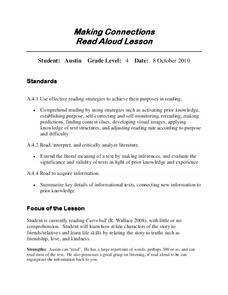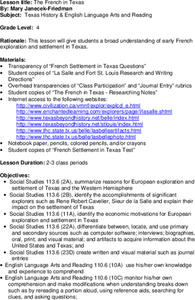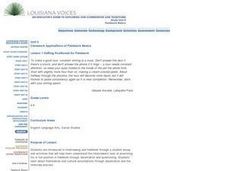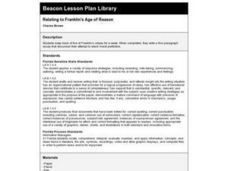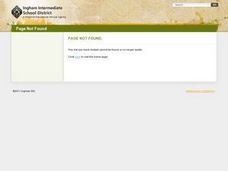Curated OER
Just the Facts, Ma'am
Elementary learners identify the main elements of story structure and form questions to summarize their reading. They listen as the teacher reads a story and then write questions to determine (1) main characters, (2) setting, (3)...
Curated OER
Analyzing Story Structure
Learners explore language arts by completing a graphic organizer in class. In this story structure lesson, students read the poem "Sick" by Shel Silverstein and discuss the different elements in the piece which make it an effective poem....
Curated OER
Reading For Information
To help learners better comprehend informational texts, they work through a series of activities. They discuss strategies, make predictions, skim passages, focus on key words, and practice taking notes. This lesson focuses on what to do...
Curated OER
Story Summaries; The Three Little Pigs
Young scholars explore language arts by completing a graphic organizer in class. In this story structure lesson, students read the classic tale "The Three Little Pigs" and discuss the main characters, conflict and setting. Young scholars...
Curated OER
Sum Stuff
Students are introduced to informational text. Students explore nonfiction as a genre. They identify the components and text structure of text nonfiction. Students read a nonfiction passage and write a summary of the passage.
Curriculum Corner
ELA Common Core Checklists for K-6
In the hustle and bustle of life in the classroom, it's easy for teachers to lose track of the standards they have taught, and those that still need to be addressed. This Common Core checklist provides educators with an easy-to-use...
Curated OER
Lizards
Fourth graders recall lizards from the text and report their important traits. The teacher adds the information to the map. They watch the map expand while it organizes all of the lizards and their characteristics.
Curated OER
Parts of a Story
Students read a short fiction book and demostrate comprehension by identifying the main characters, setting, conflict, theme, and summarizing the main points. They organize the information in Inspiration and create a powerpoint to show...
Curated OER
Using Color as a Pre-Writing Tool
To better understand how to compose a clear and well-organized paper, learners read short passages, write summaries, and make colored graphic organizers. This is a fully developed three-day activity with suggested assessments.
Curated OER
Making Connections
Fourth graders investigate visual imagery to aid reading comprehension. In this reading strategies lesson, 4th graders discover how visual imagery helps in comprehending a story. Students use a reader's notebook to record connections.
Pennsylvania Department of Education
Drawing Conclusions Based on Literary Elements
Students compare versions of Cinderella and draw conclusions based on the story elements identified. In this literacy comprehension and story elements lesson, students read several versions of Cinderella, complete a "Comparing Folklore"...
Curated OER
The French in Texas
Fourth graders use Internet to examine early French exploration and settlement in Texas, and write journal entries from point of view of 17th Century French settler, French or Spanish explorer, or Native American whose land was taken.
Curated OER
Christmas Candy
Here is a tasty topic for a lesson plan: Christmas candy! Third and fourth graders research classic Christmas candies, then create their very own! They write a descriptive paragraph about their candy, then use KidPix to create an...
Curated OER
Cloze Instruction And Herringbone Technique
Students sort out important information and create a visual framework for reviewing in the future. They organize a large quantity of information thus helping with learning and remembering details, cause and effect, comparison and...
Curated OER
Twisting Versions of Little Red Riding Hood
Students read orally two versions of Little Red Riding Hood (Classic and Cajun) They compare and contrast the two Little Red Riding Hood versions. Students create a concept map to demonstrate the comparisons/contrasts. They could also...
Curated OER
Getting Positioned for Fieldwork
Students examine interviewing and fieldwork through a student essay and activities that help them understand the interviewer's task of examining his or her position in fieldwork through observation and questioning. They explore cultural...
Curated OER
Relating to Franklin's Age of Reason
Fourth graders read a selection describing 13 virtues from "The Autobiography of Benjamin Franklin." They keep track of their behavior and whether or not they can keep up with 5 chosen virtues. They write a 5 paragraph essay on their...
Curated OER
Same, But Different
Students compare and contrast specific characters in the book, "Old Henry." They discuss similarities and differences between people and define character traits. They assess one's own character traits and have a class discussion about...
Curated OER
Nursery Rhymes
Students recall details of nursery rhyme read by teacher, identify main characters, and demonstrate knowledge of poem by creating concept map about story that includes title, clip art, and changes in font and color.
Curated OER
No Title
Fourth graders identify the characteristics of a good paragraph and find those characteristics in a good paragraph from the books, "One Day in the Woods," by Jean Craighead George and "Why Do Leaves Change Color," by Betsy Maestro.











